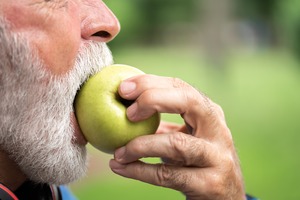
Dentures are one of the most common methods of replacing teeth, and it’s easy to see why. The treatment is an incredibly effective and cost-efficient way to replace most or all of your teeth at once, which is part of why it’s one of the first treatments that patients will reach for.
However, there are drawbacks associated with dentures that patients ought to be aware of, particularly when it comes to nutrition. If you’re curious, here’s what you should know about the diet associated with your prosthetic.
How Will Dentures Affect the Quality of your Diet?
If you’ve had your dentures for a while, you’re probably acutely aware of the fact that they can cause problems when it comes time to eat. Full dentures in particular are held in place entirely via suction, which means that they can occasionally come out of place when eating. Even if this doesn’t happen often, the fear of this occurring can make patients self-regulate what they eat, often to the detriment of their overall nutrition.
In fact, recent research into the topic seems to support this idea. Scientists at the Regenstrief Institute and Indiana University School of Dentistry analyzed medical and dental records of over 10,000 people and found that people with dentures performed worse across several key nutrition markers. If this data is to be believed, both dentists and patients should be conscientious about what they eat if they have a prosthetic.
What Can I Do If I Have Dentures?
While statistics seem to indicate that denture patients have issues with their diet, this doesn’t have to be the case for you. You might want to consult with a nutritionist who knows more about your condition and can make dietary recommendations tailored to you.
You might also want to inquire with your dentist about attaching your prosthetic to dental implants. This can afford you much greater bite strength, as well as increased overall longevity from your dentures. If you’re curious to learn more, you may want to speak to a professional who can tell you more about whether this option is right for you.
About the Author
Dr. Stephen Dean believes that dentistry is a gateway to an overall healthy life. That’s why he makes it a point to understand his patients as complete individuals, which allows him to craft comprehensive treatment plans that will ensure the best health outcomes possible. Dr. Dean received his dental degree from the Medical University of South Carolina, and he continues his education through the Dawson Academy and the Pankey Institute.
If you have any questions about dentures, he can be reached at his website or by phone at (770) 786-3915.

